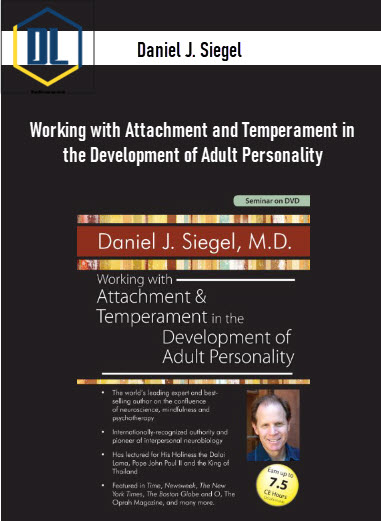Working with Attachment and Temperament in the Development of Adult Personality with Daniel J. Siegel, M.D.
$199.00 Original price was: $199.00.$39.00Current price is: $39.00.
Total Sold: 2
Product Delivery: Instant Deliver
Working with Attachment and Temperament in the Development of Adult Personality with Daniel J. Siegel, M.D.
Description of Working with Attachment and Temperament in the Development of Adult Personality
Psychotherapy enables individuals to identify patterns of thought, feeling, and behavior that may be restricting them from living a full and rewarding life. Some of these aspects of a person’s presenting profile may be due to experiences from attachment relationships while others may be a function of inborn neural propensities called temperament.
Join Daniel J. Siegel M.D., UCLA brain scientist, psychotherapist, world renowned expert and best-selling author, as he dives deeply into the study of how experiences interact with temperament in the unfolding human personality throughout the lifespan. You will focus on how to disentangle these important but distinct aspects of human development to optimize therapeutic outcome.
What you’ll learn in Working with Attachment and Temperament in the Development of Adult Personality
Serenity, Courage and Wisdom in the Psychotherapeutic Process
- Seeing the range of traits of an individual
- Discerning what is experientially formed adaptations and inborn neural propensities
- Dancing with complexity
The Importance of Genetics and Temperament in Human Development
- Schools of thought regarding temperament
- What does temperament have to do with personality?
- Where do childhood temperament variables go?
How Attachment Experiences Shape Development
- The science of attachment
- Patterns of adaptation
- Longitudinal findings
Neural Development, Relationship Patterns, and the Unfolding of Pathways of Mental Life
- One possible view of fitting temperament with attachment
- The PDP model: Patterns of Developmental Pathways of personality
- Clinical implications of the PDP model
Clinical Assessment of Adult Personality
- Applying the PDP view in day-to-day clinical practice—assessment
- The range of PDP distributions and its relationship to clinical treatment planning
- Learning to be at ease with PDP proclivities
The Chaos and Rigidity of Impaired Integration
- How attachment insecurity increases neural proclivities
- The propensity toward rigidity and chaos
- Planning a therapeutic strategy with PDP in mind
Moving Toward Change: Integration and Coming to Feel at Home in One’s Own Skin
- Enjoying PDP proclivities rather than being imprisoned by them
- Relationships and PDP variables
- Weaving the power of temperament frameworks with the adaptation of attachment within psychotherapy
Healing and Acceptance in Adult Personality
- The Plane of Possibility and the Wheel of Awareness
- Moving toward health in the face of restricted adaptations
- Pleasure in personality and the emergence of acceptance and harmony
Target Audience
Counselors, Social Workers, Psychologists, Psychotherapists, Therapists, Marriage and Family Therapists, Case Managers, Nurses, Occupational Therapists & Occupational Therapist Assistants, Other Mental Health Professionals
Objectives
- Outline ways in which childhood temperament may persist as adult personality.
- Identify the ways in which attachment influences the development of emotion regulation and the capacity for intimacy in adulthood.
- Discuss how psychotherapy can loosen the grip of temperament and heal the lingering impact of traumatic experiences.
- Identify the spectrum of personality traits and how these fit into the notion of “categories” of attachment.
- Explain the ways in which inborn neural propensities interact with experience to shape personality.
- Recognize the importance of genetics and temperament in human development.
About Daniel J. Siegel, M.D.

Daniel J. Siegel, MD, is a graduate of Harvard Medical School and completed his postgraduate medical education at UCLA with training in pediatrics and child, adolescent, and adult psychiatry. He is currently a clinical professor of psychiatry at the UCLA School of Medicine, founding co-director of UCLA’s Mindful Awareness Research Center, founding co-investigator at the UCLA Center for Culture, Brain and Development, and executive director of the Mindsight Institute, an educational center devoted to promoting insight, compassion, and empathy in individuals, families, institutions, and communities.
Dr. Siegel’s psychotherapy practice spans thirty years, and he has published extensively for the professional audience.
He serves as the Founding Editor for the Norton Professional Series on Interpersonal Neurobiology which includes over 70 textbooks.
Readmore about: Daniel J. Siegel
Related products
Instant Delivery
John Dupuy & Nadja Lind – iAwake Technologies – Strong Medicine
Total sold: 3
Metaphysical & Self Help
Metaphysical & Self Help
Instant Delivery
Total sold: 1
Instant Delivery
Instant Delivery
Total sold: 1
Instant Delivery
Total sold: 2
Instant Delivery
Total sold: 2












